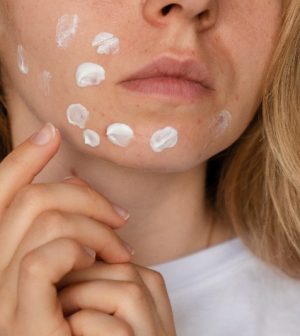- Could Your Grocery Store Meat Be Causing Recurring UTIs?
- Are You Making This Expensive Thermostat Error This Winter?
- Recognizing the Signs of Hypothyroidism
- 10 Strategies to Overcome Insomnia
- Could Artificial Sweeteners Be Aging the Brain Faster?
- Techniques for Soothing Your Nervous System
- Does the Water in Your House Smell Funny? Here’s Why
- Can a Daily Dose of Apple Cider Vinegar Actually Aid Weight Loss?
- 6 Health Beverages That Can Actually Spike Your Blood Sugar
- Treatment Options for Social Anxiety Disorder
Carcinogen Benzene Can Form in Some Acne Treatments: Report

Some acne treatments may banish blemishes but carry hidden dangers: A new report reveals high levels of the carcinogen benzene can form in products that contain the zit-fighting ingredient benzoyl peroxide.
According to the new report from the independent laboratory Valisure, benzene “can form at unacceptably high levels” in both prescription and over-the-counter benzoyl peroxide products.
Some tests showed that certain products had more than 800 times the concentration limit for benzene that the U.S. Food and Drug Administration allows.
What triggers the formation of benzene in these treatments?
Tests showed that when they were stored or handled at high temperatures — such as when left in a hot car for days — they can generate high levels of benzene.
In one test, an acne product was stored at 158 degrees Fahrenheit for nearly 17 hours. The lab not only detected benzene inside the product, but benzene gas found in the air around it was more than 1,200 times the threshold that the U.S. Environmental Protection Agency allows for long-term exposure.
Other types of acne treatment products that were tested, such as those containing salicyclic acid or adapalene, did not have that issue, according to the lab.
Valisure also sent a citizen petition to the FDA in which it described an initial analysis of 175 acne treatment products, finding that 99 of them contained benzoyl peroxide, with benzene detected in 94 of those products.
The petition urges the FDA to “request recalls and a suspension of sales for products containing the active pharmaceutical ingredient benzoyl peroxide.”
An FDA spokesperson said in a statement Wednesday that it has received the citizen petition, CNN reported.
“The agency acts on information provided from a variety of sources, such as that provided by Valisure, but such data must be verified as accurate and reproducible before it can be utilized to make regulatory decisions such as recommending product sale suspensions and recalls,” the statement said.
Benzene is one of the 20 most widely used chemicals in the United States, and people are exposed “mainly by breathing in air containing benzene,” according the American Cancer Society.
Benzene is also used in a variety of products including lubricants, dyes, detergents and drugs.
This isn’t the first time Valisure has sent a citizen petition letter to the FDA regarding concerns about benzene. In 2022, the lab found benzene in dry shampoo products and urged the FDA to request recalls, and the lab detected benzene in sunscreen in 2021.
But this latest report differs in significant ways, Valisure officials noted.
“This discovery of benzoyl peroxide’s fundamental instability and formation of benzene is substantially different than Valisure’s previous findings of benzene in sunscreens, hand sanitizers and other consumer products,” Valisure co-founder and President David Light said in a statement Wednesday.
“The benzene we found in sunscreens and other consumer products were impurities that came from contaminated ingredients; however, the benzene in benzoyl peroxide products is coming from the benzoyl peroxide itself, sometimes at hundreds of times the conditional FDA limit,” he said. “This means the problem broadly affects benzoyl peroxide products, both prescription and over-the-counter, and necessitates urgent action.”
More information
Visit the National Cancer Institute for more on benzene.
SOURCE: Valisure, news release, March 6, 2024; CNN
Source: HealthDay
Copyright © 2026 HealthDay. All rights reserved.










